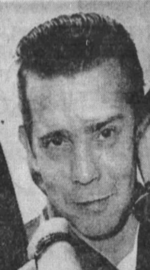 Green Bay Press-Gazette (Greenbay, WI), August 16, 1973 Convicted in Cook County, Illinois, on August 17, 1971, of murder based upon circumstantial evidence, Wilbur McDonald was released 1,100 days after his conviction following another man’s confession that he, not McDonald, had committed the murder. Agnes Lehmann, a 46-year-old woman, was found dead in Chicago’s Grant Park on July 11, 1970. Lehmann had been sexually assaulted. The same night, Wilbur McDonald, who had no criminal record, was found beaten unconscious in another part of Grant Park – his skull was fractured and most of his teeth had been knocked out. He claimed he had been mugged and beaten when crossing through the park. McDonald’s shoe was found about fifteen feet from Lehmann’s body. Police officers brought McDonald to the hospital for medical attention. When McDonald regained consciousness, he was detained and charged with the murder of Agnes Lehmann, whom he denied having ever seen. When he was found guilty by a jury in August 1971 based on circumstantial evidence, he told reporters that he “thought the jury was bought out.” Following McDonald’s incarceration, two more young women were brutally murdered in Grant Park under similar circumstances, but police made no further arrests. Then, on August 13, 1973, Judith Ott and her young family were visiting from Massachusetts and she went into the restroom at Grand Park. Her husband and baby were waiting outside and the husband soon heard screams coming from the restroom. He then saw a man – Lester Harrison – running away with a bloody knife. He proceeded to chase Harrison down, and, with the help of a few park employees, Harrison was caught. Harrison, who had a criminal record dating back 30 years, was out of prison on bail. Once in police custody, Harrison admitted to murdering not only Judith Ott but also the three other women who had been killed in Grant Park – including Agnes Lehmann. Harrison provided police with many additional details regarding Lehmann’s death, confirming for them that he was the true killer. Following this confession by Harrison, McDonald was released from prison on August 15, 1973. He was awarded a new trial in which the state moved to nolle prosse the case. On August 19, 1974, the Governor granted McDonald a full pardon based on innocence. After his release, McDonald sued the State of Illinois for $5 million dollars and was awarded $15,000 – the maximum amount of compensation for wrongful imprisonment permitted under Illinois law at that time, based on the amount of time McDonald had been incarcerated. McDonald challenged this state limit on payment to the wrongfully imprisoned. The case went up to the Supreme Court but McDonald lost, and the state’s attorney then sent him a legal bill for their costs in defending against this case. When asked about his wrongful conviction, McDonald said “You ever believe in something like your country, and have it fall apart? I thought, ‘How can this be?’ Am I in Russia or something? What had I done to waste three years of my life?” – Researched by Brent Shraiberg and Beth Cruz
|